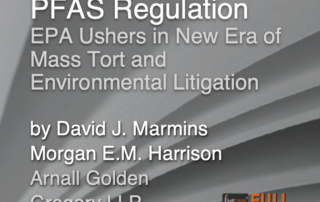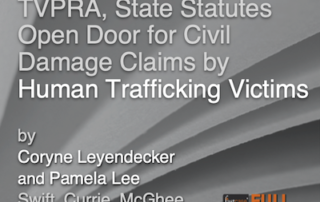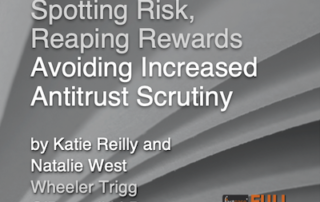
Emerging Litigation Podcast
Technology-Assisted Review: Sara Lord Interviews Data Scientist Lenora Gray
In this episode, Sara Lord of Legal Metrics speaks with Lenora Gray of Redgrave Data about eDiscovery in the practice of litigation and how it has been transformed by technology-assisted review tools – or TAR, and how these tools work. Every litigator needs to understand how eDiscovery tools work. They should be able to answer questions around the approach being used, why that approach was chosen, the reliability of the assisted review, what human oversight was implemented, and more. Listen and learn. PLUS: Watch the video for outtakes and bonus content!
Jury Selection in the Age of Conspiracy Theories and Distrust with Tara Trask
In this episode, we discuss picking juries in an age of misinformation, general distrust, tribalism, unleashed social media surfers, and unorthodox legal strategies unfolding on a daily basis with Tara Trask of Trask Consulting, jury and trial expert. "Jury service is an opportunity for everyday Americans to interact with an important institution, our courts, and play their part as citizens,"Trask says. "The court system could very well be our saving grace in trying to hang on to our democracy." Listen now.
Transforming Legal Workflows with AI: Sara Lord Interviews Tara Emory and Wilzette Louis
In this episode, Sara Lord of Legal Metrics speaks with Tara Emory and Wilzette Louis of Redgrave Data about the game-changing potential of robotic process automation and AI, and how these are not just futuristic concepts but practical solutions to today's legal challenges. As Tara notes, "Wherever your team is spending most of its time on manual tasks, that’s where you can further automate with technology and get the most benefit". Wilzette adds, "AI-driven automation technology can take different aspects of an entire workflow and bring them into a set of processes that a software robot can perform for you. Soon, adopting such technology will be a must for firms to compete". Listen and learn more!
A Shameless Plug for Our Content Services
Your content marketing is everything you’ve ever dreamed of. Right?

Critical Legal Content was founded by Tom Hagy, former Editor & Publisher of Mealey’s Litigation Reports and VP at LexisNexis, founder of HB, current litigation podcaster and editor-in-chief. CLC’s mission is to help smaller firms and service providers not only create content — blogs, articles, papers, webinars, podcasts (like the stuff on this site) — but also to get it out there. How? Via social media, this website, your website, and potential via our podcast and journal which we publish in collaboration with vLex Fastcase and Law Street Media. The goal is to attract readers and dizzy them with your brilliance.
*Inspired by actual events.
Create content like a real legal publisher.
Journal on Emerging Issues in Litigation
PFAS Regulation: EPA Ushers in Next Era of Mass Tort and Environmental Litigation
PFAS claims are the next frontier of mass tort and environmental litigation. With the EPA poised to finally enact the first regulation of these chemicals, that frontier is ripe for exploration. This article explores PFAS and the origin of litigation around the substances as well as the state of PFAS litigation and regulation today. It concludes with some thoughts on what to expect when it comes to PFAS litigation going forward.
TVPRA, State Statutes Open Door for Civil Damage Claims by Human-Trafficking Victims
Since 2003, when Congress opened the door for human-trafficking victims to sue for civil damages under the Trafficking Victims Protection Act of 2000 (TVPRA), the TVPRA and similarly drafted state statutes have allowed for human-trafficking victims to seek civil damages against any party that has benefited from their trafficking. Given this expansive inclusion of third-party liability, more and more businesses, especially those in the hospitality industry, are ultimately the ones left to pay for the criminal acts of human traffickers. In this article, the authors, Coryne Leyendecker and Pamela Lee discuss the evolving litigation around human-trafficking claims and offer guidance on how businesses can build a foundation for their own defense while simultaneously helping prevent human-trafficking crimes from occurring in the first place.
Spotting the Risk, Reaping Rewards: Avoiding Increased Antitrust Scrutiny
The Authors Katie has favorably represented antitrust clients in matters involving monopolization, conspiracy, price fixing, exclusive dealing, and other competition-related disputes, including trade secrets and non-compete actions. She has extensive knowledge of the regulatory hurdles and obligations her clients face. Katie earned her J.D. from the New York University School of Law, cum laude. Natalie West represents sophisticated clients in complex commercial disputes. She regularly serves as the lead brief writer in antitrust cases, employment and consumer class actions, and appellate matters. Natalie graduated with high honors from the University of Texas School of Law, where she served as a member of the Texas Law Review and was elected to the Order of the Coif. Interviews with leading attorneys and other subject matter experts on new twists in the law and how the law is responding to new twists in the world. Avoiding Antitrust Scrutiny Spotting the Risk, Reaping Rewards The increase in aggressive antitrust enforcement has certainly received significant attention. For the moment, juries are not rewarding the prosecutors. That said, even an unsuccessful government investigation is itself costly and can motivate plaintiffs’ lawyers. Best practices involve not only following the law but also maintaining solid optics to avoid the need for an expensive, if ultimately successful, defense. Abstract: A decade ago, few lawyers across the country spent significant time thinking about antitrust law. But, since then, there has been an onslaught of antitrust attacks on businesses and executives across all sectors of the economy. Enforcement efforts have skyrocketed following President Biden’s July 2021 executive order directing a “whole of government” crackdown on competition abuses—and the trend shows no sign of letting up. Today, no matter the industry or the size of the business, everyone needs to understand these risks and have strategies to minimize them. This article will walk [...]









